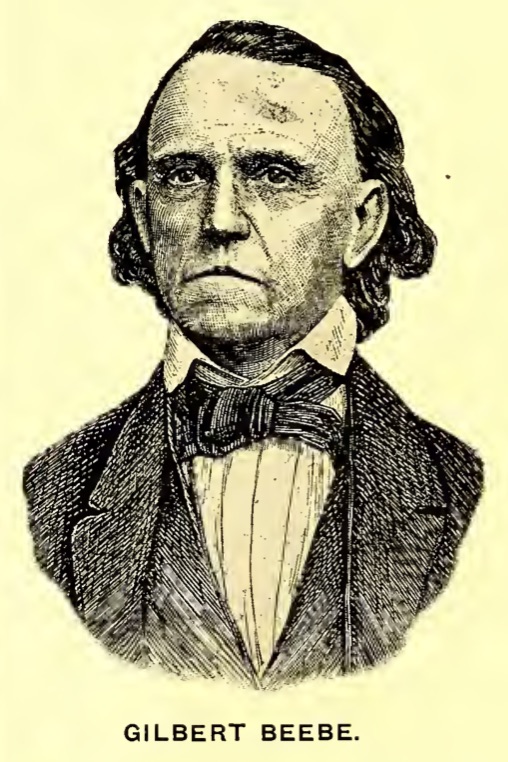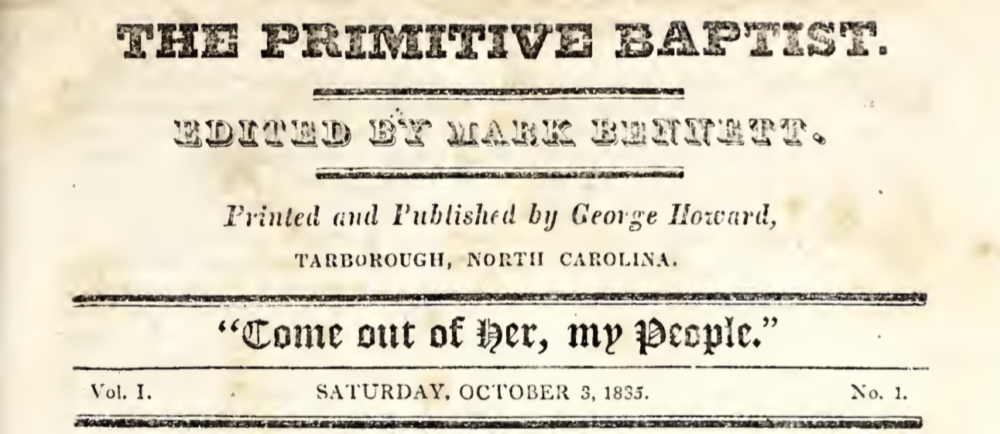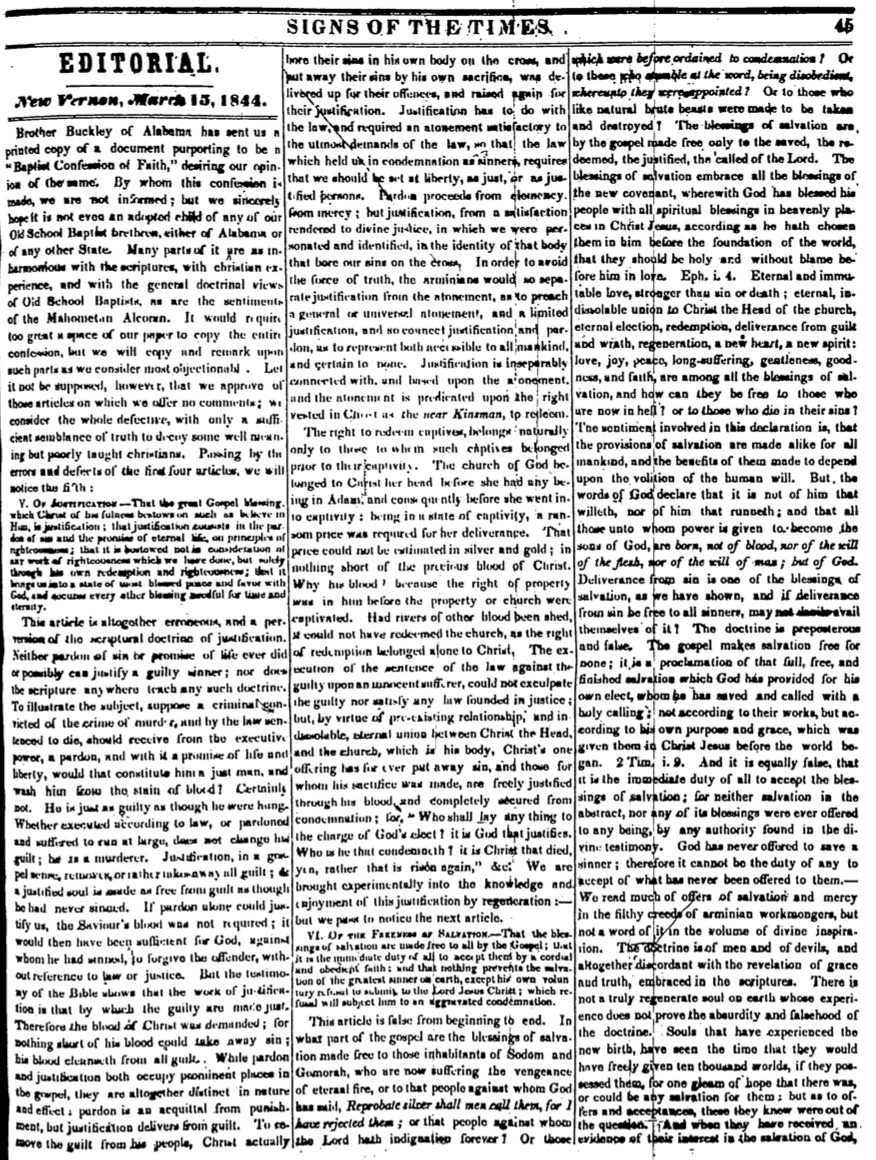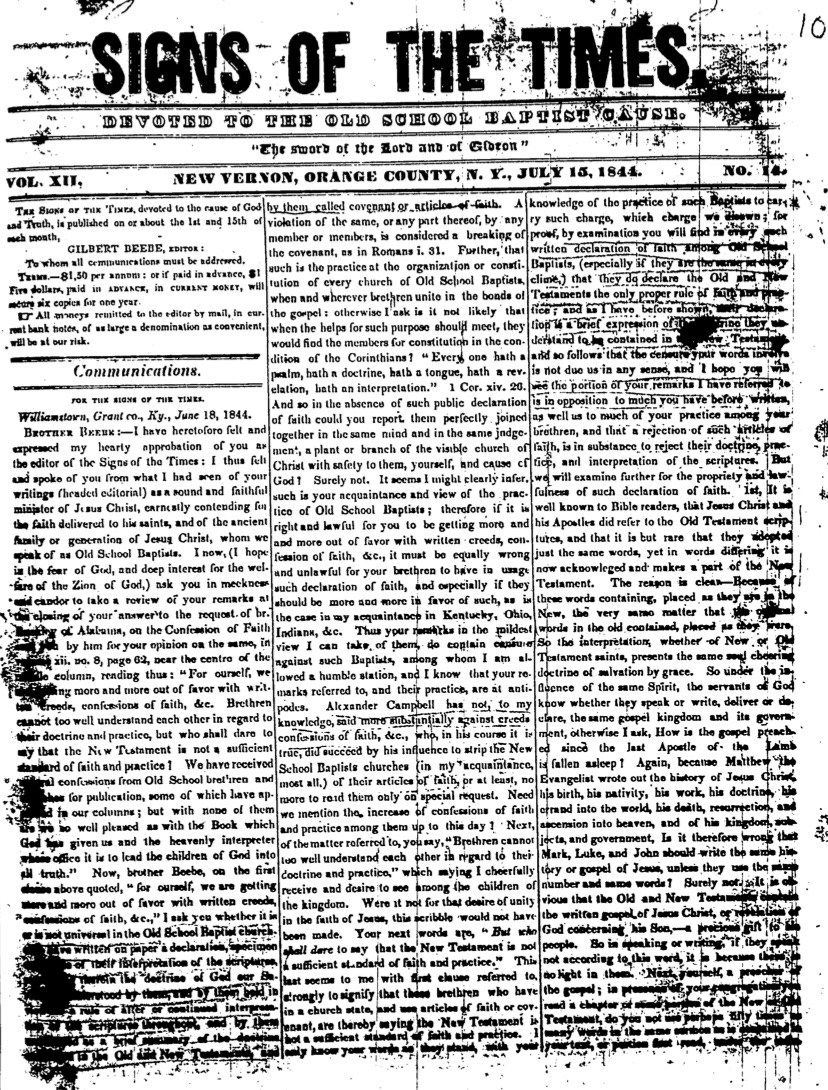Long before the advent of FaceBook, list servers, or any modern social media technology, there were periodical newspapers magazines, and other printed publications through which ideas were disseminated and controversies were fomented.
Among 19th century Baptists, prominent periodicals were the source of news, theological training, and debates. Editors invariably became the most influential of ministers in each denominational affiliation and the names of such notables as:
Thomas Meredith (Biblical Recorder, NC), Jesse Mercer (Christian Index, GA), J. R. Graves (The Tennessee Baptist, TN) among the New School Baptists and Gilbert Beebe (The Signs of the Times, NY), Burwell Temple (The Primitive Baptist, NC), John Clark (Zion’s Advocate, VA) P. D. Gold (Zion’s Landmark, NC), J. R. Respess, and Sylvester Hassell (The Gospel Messenger, GA/NC) among the Old School brethren would become household names in short order.
It is interesting, in reviewing some of these publications, to observe the similarities between the topics, tactics and misunderstandings/miscommunications then and now.
Even as those of us who participated in list serve dialogues in the late ’90’s through 2000’s may comment on the similarities between our discussion and the childish squabbles observed today on FaceBook group pages, we ought to consider that we were by no means the first to engage in such discussions on public forums. It seems that some lessons are never really learned from generation to generation.
As a case in point, I want to share with you a controversy that erupted among the Old School Baptists in 1844-45.
Among the many items of interest to me in the following correspondence is the fact that in 1844, more than 10 years after its publication, the New Hampshire Confession still had not been noticed or addressed by the Old School brethren.
The New Hampshire Confession of Faith was drafted by John Newton Brown of Exeter, New Hampshire and was first published in 1833 when it was adopted by the New Hampshire Baptist Association. This document evidently found its way into the hands of Brother Buckley in Alabama in the latter part of 1843. Brother Buckley mailed the confession to Elder Gilbert Beebe at The Signs of the Times, requesting comments on it.
 In the editorial section of the March 15, 1844, v. XII, no. 6, Signs of the Times, under the heading Baptist Confession of Faith, Elder Beebe presented his answer to the New Hampshire Confession.
In the editorial section of the March 15, 1844, v. XII, no. 6, Signs of the Times, under the heading Baptist Confession of Faith, Elder Beebe presented his answer to the New Hampshire Confession.
The NHCoF is notable as it gained increasing support from and adoption by the Southern Baptist and Missionary Baptist churches over the course of the next 100 years after its introduction. The document waters down the Calvinism of the 1689 London Baptist Confession sufficiently to allow for the embrace of any number of “means” based schemes of salvation which are better suited to the Missionary activities and innovations of the New School Churches. Elements of the New Hampshire Confession remain in the current (2000) Baptist Faith and Message which is the statement of faith held by the Southern Baptist Convention today.
In Elder Beebe’s response, he points out the most egregious errors of the New Hampshire document which he identifies as: Article V. Of Justification; Article VI. Of the Freeness of Salvation; Article VIII. Of God’s Purpose of Grace; and Article X. Harmony of Law and Gospel. Finally, in a departure from the doctrine of the 1689 confession as well, Beebe disputes Article XIII. Of the Christian Sabbath arguing that there is no sabbath commanded for New Testament observation, but rather each day is alike the Lord’s Day and should be observed as such. (Interestingly, Elder John Leland appears to have shared Beebe’s position on this matter and a substantial defense of Beebe’s stance was undertaken by his associate Samuel Trott in subsequent issues.)
The source of the controversy generated by this editorial was nothing that Beebe, or any other reasonable individual might have imagined as he published his article.
In his closing paragraph, Elder Beebe wrote:
“We have before observed that there are other objectionable things embraced in this “Confession of Faith;” we have, in accordance with brother Buckley’s request, pointed out what we consider most objectionable. And as the items which we have dwelt upon are of general interest; we hope the brethren in other parts of our land may be led to examine this matter. For ourself we are getting more and more out of favor with written creeds, confessions of faith, &c. Brethren cannot too well understand each other in regard to their doctrine and practice, but who shall dare to say that the New Testament is not a sufficient standard of faith and practice? We have received several confessions from old school brethren, and churches for publication, some of which have appeared in our columns; but with none of them are we so well pleased as with the Book which God has given us and the heavenly Interpreter whose office it is to lead the children of God into all truth. May all who love the Lord be ever under his salutary influence, and feel in their hearts that they are not their own, that they are bought with a price, and that it is their privilege to glorify God in their bodies and spirits which are his.”
Apparently in that same period, due in part to the rise of Campbellism (the Church of Christ) and its rejection of creeds, covenants, and heritage in general, the Western Old Baptist Churches had adopted a practice of regularly (monthly) reading of their Articles of Faith and Church Covenant. Furthermore, they were emphasizing the importance of identification with a heritage of faith and the documents which bore evidence of that heritage.
For this reason, Elder Beebe’s closing paragraph struck a discordant note among some of the more prominent Western Baptist ministers, eliciting a reply from Elder William Conrad of KY. The ensuing discussion/debate included correspondence from such notable pastors as Elder Theodrick Boulware of Missouri, Elder Thomas P. Dudley of Kentucky. Eventually, Beebe doubled down on his position by assisting the Warwick Association in formally rejecting all “creeds and confessions” in favor of corresponding with those only who receive the Scripture alone as their rule of faith and practice.
As you read through the statements on each side of the discussion, you will doubtless note positions espoused that are not in keeping with your current understanding of the church’s practice and perhaps doctrine. This illustrates how error can creep in on each side, and how argument can breed error and/or drive us to extremes we might otherwise never have imagined. The Signs of the Times – Vol. 12, 1844
In closing, we present you the text of Elder Conrad’s reply to Beebe’s first editorial. In the linked documents and photos, you will find the original source and be able to browse through the writings of these Old Baptist fathers.
Blessings,
Joseph Weyel
SIGNS OF THE TIMES – Vol. XII. No. 14. – July 15, 1844
Williamstown, Grant Co., Ky., June 18, 1844.
BROTHER BEEBE: — I have heretofore felt and expressed my hearty approbation of you as the editor of the Signs of the Times: I thus felt and spoke of you from what I had seen of your writings (headed editorial) as a sound an faithful minister of Jesus Christ, earnestly contending for the faith delivered to the saints, and of the ancient family or generation of Jesus Christ, whom we speak of as Old School Baptists. I now, (I hope in the fear of God, and deep interest for the welfare of the Zion of God,) ask you in meekness and candor to take a review of your remarks at the closing of your answer to the request of br. Buckley of Alabama, on the Confession of Faith sent by him for your opinon on the same, in volume xii. No. 8, page 62, near the centre of the middle column, reading thus: “For ourself, we are getting more and more out of favor with written creeds, confessions of faith, &c. Brethren cannot too well understand each other in regard to their doctrine and practice, but who shall dare to say that the New Testament is not a sufficient standard of faith and practice? We have received several confessions from Old School brethren and churches for publication, some of which have appeared in our columns; but with none of them are we so well pleased as with the Book which God has given us and the heavenly interpreter whose office it is to lead the children of God into all truth.”
Now, brother Beebe, on the first claim above quoted, “for ourself, we are getting more and more out of favor with written creeds, confessions of faith, &c.,” I ask you whether it is or is not universal in the Old School Baptist churches to have written on paper a declaration, specimen explanation of their interpretation of the scriptures, providing therein the doctrine of God our Saviour is understood by them, and by them held in ——– a rule of after or continued interpretation of the scripture throughout, and by them explained as a brief summary of the doctrine contained in the Old and New Testament, and by them called covenant or articles of faith. A violation of the same, or any part thereof, by any member or members, is considered a breaking of the covenant, as in Romans i. 31.
Further, that such is the practice at the organization or constitution of every church of Old School Baptists, when and wherever brethren united in the bonds of the gospel: otherwise I ask is it not likely that when the helps for such purpose should meet, they would find the members for constitution in the condition of the Corinthians? “Every on hath a psalm, hath a doctrine, hath a tongue, hath a revelation, hath an interpretation.” 1 Cor. xiv. 26. And so in the absence of such public declaration of faith could you report them perfectly joined together in the same mind and in the same judgement, a plant or branch of the visible church of Christ with safety to them, yourself, and cause of God? Surely not. It seems I might clearly infer such is your acquaintance and view of the practice of Old School Baptists; therefore if it is right and lawful for you to be getting more and more out of favor with written creeds, confessions of faith, &c., it must be equally wrong and unlawful for your brethren to have in usage such a declaration of faith, and especially if they should be more and more in favor of such, as is the case in my acquaintance in Kentucky, Ohio, Indians, &c. Thus your remarks in the mildest view I can take of them, do contain censure against such Baptists, among whom I am allowed a humble station, and I know that your remarks referred to, and to their practice, are at antipodes.
Alexander Campbell has not, to my knowledge, said more substantially against creeds, confessions of faith, &c., who, in his course it is true, did succeed by his influence to strip the New School Baptist churches (in my acquaintance most all.) of their articles of faith, or at least, no more to read them only on special request. Need we mention the increase of confessions of faith and practice among them up to this day? Next of the matter referred to, you say, “Brethren cannot too well understand each other in regard to their doctrine and practice,” which saying I cheerfully receive and desire to see among the children of the kingdom. Were it not for that desire of unity in the faith of Jesus, this scribble would not have been made. Your next words are, “But who shall dare to say that the New Testament is not a sufficient standard of faith and practice.” This last seems to me with first clause referred to, strongly to signify that these brethren who have in a church state, and use articles of faith or covenant, are thereby saying the New Testament is not a sufficient standard of faith and practice. I only know your words as they stand, with your knowledge of the practice of such Baptists to carry such a charge, which charge we disown; for proof, by examination you will find in every such written declaration of faith among Old School Baptists, (especially if they are the same in every clime,) that the do declare the Old and New Testaments the only proper rule of faith and practice; and as I have before shown, their declaration is a brief expression of the doctrine they understand to be contained in the New Testament and so follows that the censure your words invoke is not due us in any sense, and I hope you will see the portion of your remarks I have referred to is in opposition to much you have before written, as well as to much of your practice among your brethren, and that a rejection of such articles of faith, is in substance to reject their doctrine, practice, and interpretation of the scriptures.
But we will examine further for the propriety and lawfulness of such declaration of faith. 1st, It is well known to Bible readers, that Jesus Christ and his Apostles did refer to the Old Testament scriptures, and that it is but rare that the adopted just the same words, yet in words differing it is now acknowledged and makes a part of the New Testament. The reason is clear—Because of three words containing, placed as they are in the New, the very same matter that the original words contained in the Old contained, placed as they were. So the interpretation, whether of New or Old Testament saints, presents the same soul cheering doctrine of salvation by grace. So under the influence of the same Spirit, the servants of God know whether they speak or write, deliver or declare, the same gospel kingdom and its government, otherwise I ask, How is the gospel preached since the last Apostle of the Lamb is fallen asleep? Again, because Matthew the Evangelist wrote out the history of Jesus Christ, his birth, his nativity, his work, his doctrine, his errand into the world, his death, his resurrection, and ascension into heaven, and of his kingdom, subjects, and government. Is it therefore wrong that Mark, Luke, and John should write the same history or gospel of Jesus, unless they use the same number and same words? Surely not. It is obvious that the Old and New Testaments contain the written gospel of Jesus Christ, or revelation of God concerning his Son,–a precious gift to his people. So in speaking or writing, if they speak not according to this word, it is because there is no light in them. Next, yourself, a preach of the gospel; in presence of your congregation you read a chapter or some portion of the New or Old Testament, do you not use perhaps fifty time as many words in the same sermon as is contained in your text, or portion first read, under the influence of the Holy Spirit? Is not all you say while thus speaking, in harmony with the doctrine contained in the said portion so read, and of course with the rest of the Scriptures? And again, you have written much on the subject of the religion of Jesus, his doctrine, his church, and discipline. Is all you have preached and all you have written the New Testament a proper standard of faith and practice? If you answer in the affirmative, I ask, would it not be a good creed or confession of faith? But if the answer should be in the negative, “Why not get more and more out of favor with preaching, and especially writing? for write or preach, when and where you will, it is your creed or confession of faith, so that I see not, if indeed you are an Old School Baptist, how you can speak lightly of covenants or articles of faith in use among brethren, written, as they should be, in harmony with the Testament. Again, the standard of faith.
It is well known that every standard or rule (the substance) will give its own shade or shadow under all circumstances, while the light prerequisite to see or use such standard is present, so every type or impress gives its own likeness. This we cannot deny; for it is said, “He that dwelleth in the secret place of the Most High, shall abide under the shadow of the Almighty.” Psalm ix. 1. If then we shall, under the shadow or influence of the heavenly interpreter be led to show to the household of faith a few lively expressions of our Father’s name, his mercy, glory, and excellency; some brief expressions of his bequest, his will, his kingdom, and government of his subjects in this world, and that every one of his children are destined to meet after a few more days of suffering with God their Father, and Jesus Christ, their Elder Brother in heaven above, and go out no more forever. This shade, even in the shape (holding, the substance) of a truly Old School Baptist covenant or article of faith, surely such sight would be worth looking at, and such melodious sound worth hearing read once every month. Such is mostly the case among Old Fashioned Baptists in Kentucky. Yes, let such interpretation abide with us however coarsely written, but pointing to the Old and New Testament for its zest, that the generations to come may see and hear our view and interpretation of the scriptures.
Lastly, “But with none of them are we so well pleased as with the Book God has given us,” &c. Well, I hope I feel please with the Book and heavenly Interpreter’s glorious bequest to sinners, the purchase of his blood: yet be it remembered, that though this gift is eternal and sure to all the seed, they cannot see the Book nor hear the heavenly Interpreter’s voice until begotten of God and born of the Spirit; then after seeing the glory of God in the face of Jesus, and brought to know the joyful sound, they will be speaking of the glory of his kingdom, and talking of his power. Will the eyes of such become tired of seeing, the ear dull of hearing, and the heart slow of understanding the Interpreter’s voice that shows them the things of Jesus as recorded in the Book, without which voice the Testament can profit them but little in this world, if any? I think not. Is it not the case then that they speak that which they do know, and testify of the things they have seen? So then as well write down after the Interpreter’s voice as speak. Is there therefore any difference between that so written and the Testament? If not, it would seem clear to me that you might as soon become more and more out of favor with the Book and heavenly Interpreter, as the things or doctrine the Interpreter declares the Book to contain; and further, that they are written on the fleshly tables of your heart: then the book, the heart of flesh, and the Interpreter, these three agreeing in one, may it not be written, even that doctrine which the experience of every child of God contains.
The above I submit to you, my brother, for your examination and scrutiny, and request an insertion of it in your paper, that the brethren in general may judge between us. This done, my object is accomplished.
I subscribe myself your unworthy brother in tribulation,
WILLIAM CONRAD


